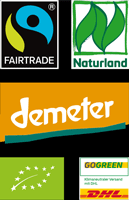What value does food actually have for us?
Is this a German, or at most a European issue, when farmers complain about the lack of appreciation for their work? I don’t know how farmers in the USA, for example, see it, but there are definitely two hearts beating in my chest here.
On the one hand, I personally have zero appreciation for factory farming, monocultures, slurry floods, and antibiotic spraying. The costs of this have to be borne by society (and future generations). Why should we appreciate that?
On the other hand, I can relate very well when people have to work or be present 24/7 – farmers don’t have a 40-hour week – for an hourly wage of between €5 and €20*. And they also have to take responsibility for animals, people, the environment, the quality of their products, etc. (not to mention insurance, rent, pensions, etc.).
If they are then of the opinion that, for example, the 50 cents per liter of organic milk that goes to them** (retail price: €1.25) is not enough, if they then go on the warpath – then I am not surprised. (Incidentally, the price of 67 cents that the Bioland and Naturland associations recently defined as a guide price*** would also only cover costs).
Perhaps in this case “inexpensive” doesn’t mean cheap, but stingy.
Germans do not care what ends up on their plate?
Not true. At least if the statistics are to be believed. Here’s a bit of number crunching:
According to a survey in 2021, there were around 10.79 million people in the German-speaking population who fully agreed with the statement “I value healthy eating, even if it costs more.”**** (translated from German) And in 2023, there were more people than ever before (24.52 million, aged 14 and over, German-speaking) who would pay a lot for health and wellness.
But: Food still only accounts for 11.5% of private consumption in Germany (2022). By far the largest share, almost a quarter of expenditure, goes on housing costs, followed by transportation at 16%. By way of comparison: In Italy, the proportion spent on food is 14.4% and in France 13.3%.
If you then also consider the fact that Germans prefer to shop in supermarkets (76%) and discount stores (69%) and that organic food only accounts for around 6%* of the total market – wheeew. Wishes are not reality.
The true costs.
What would actually happen if we paid a price for our food that included all the follow-up costs incurred during production?
So, let’s talk about the “true costs” of food – including its consequences on the climate, environment, and society. At the moment, we all pay them indirectly, e.g. through the consequences of climate change. If they were priced in, then conventionally produced products such as milk, yoghurt etc. would have to be 122% more expensive than they are today. Organic milk products would be 69% more expensive, but the price of organic tomatoes, for example, would only rise by 5%. This was determined by the University of Augsburg in its TCA (True Costs Analysis).
Dr. Tobias Gaugler from the Institute for Materials Resource Management at the University of Augsburg, Germany says: The highest external follow-up costs and therefore the greatest mispricing are associated with the production of conventionally produced food of animal origin. Conventionally produced meat and sausage products should be three times as expensive at producer level as they currently are. (translated from German) Other serious consequences such as the societal impact of antibiotic resistance or the ecological impact of pesticide use were not taken into account in the calculations.*****
What costs a lot is also worth a lot.
Of course, such prices would probably also lead to heavy protests. However, they would also mean that less food would be wasted and the appreciation of good food would be considerably higher. After all, it’s so much more than just a source of energy and nutrients, it makes you feel good – I’m just saying: chocolate.
And above all: Coffee! (Organic coffee, of course)
For us, it’s a lifesaver every morning.
For our coffee farmers, it is existential.
For nature in the growing regions (in the case of organic or Demeter cultivation) it is definitely a benefit.
And for you? How do you see it from outside Germany? Is this “just our national problem”, is it a form of German Angst? Let us know in the comments what food and your favorite coffee are worth to you. We look forward to it.
By the way, if you would like to know more about the positive effects of coffee, here is a small list of links. Have fun browsing.
Sources:
All figures relate to the German market.
*www.spiegel.de/wirtschaft/unternehmen/subventionskuerzungen-in-der-landwirtschaft-das-verdienen-bauern-wirklich
**www.landwirtschaft.de/diskussion-und-dialog/fragen-sie-einen-landwirt/bereits-beantwortete-fragen/welcher-anteil-des-ladenpreises-kommt-beim-landwirt-an
***www.bioland-fachmagazin.de/news/detail/bio-milch-erhaelt-orientierungspreis
****www.umweltbundesamt.de/daten/private-haushalte-konsum/konsum-produkte/gruene-produkte-marktzahlen/marktdaten-bereich-ernaehrung#biolebensmittel-einbussen-in-2022
*****www.uni-augsburg.de/de/campusleben/neuigkeiten/2020/09/04/2735/
Source for all other figures: Statista




